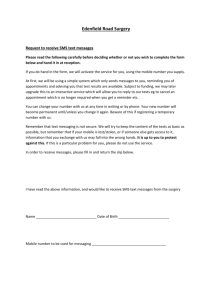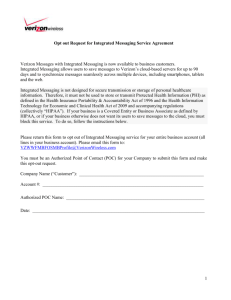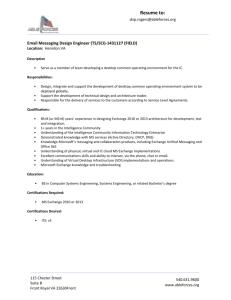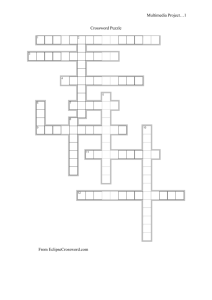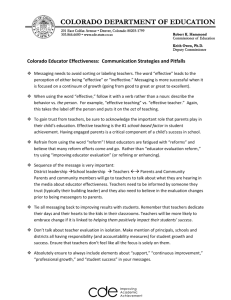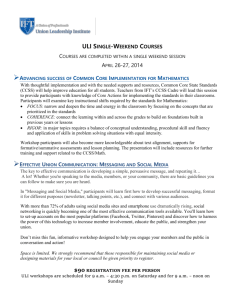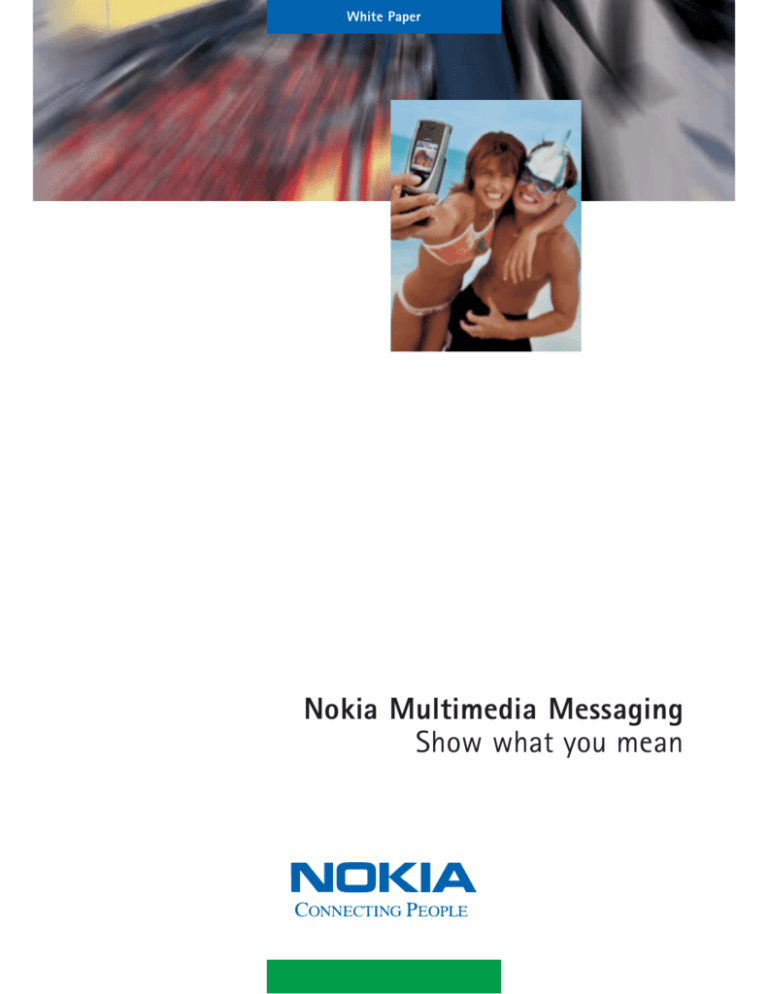
White Paper
Nokia Multimedia Messaging
Show what you mean
White Paper
Contents
2
Executive Summary
3
Addressing the Mobile World’s demands
Creating new communication styles
Multimedia Messaging Service
New generation, new market drivers
Get the picture?
Mobile messaging made easy
4
4
5
5
6
6
Smoothing the path to a new messaging world
Short Message Service (SMS)
Picture Messaging
Multimedia Messaging Service (MMS)
7
7
7
8
Multimedia messaging = multiple benefits
Advantages for consumers
Advantages for network operators and service providers
Demand for applications
Harnessing the technology
9
9
10
10
11
Case history: Multimedia Messaging in action
12
Multimedia Messaging is business today
Why Nokia?
13
13
White Paper
Executive Summary
The Nokia Multimedia Messaging Solution facilitates new
styles of communication that respond to the needs of the
Mobile World – a world where business and personal lifestyles
are changing and evolving ever faster. This calls for flexible
products and services that facilitate and support our new
routines, and provide delightful experiences. Communication
is at the heart of people’s lives – and as a result, the mobile
phone is infused with rich new meaning.
Nokia’s approach is based upon a series
of evolutionary steps: SMS (text),
Picture Messaging (text and graphics),
MMS – Multimedia Messaging Service
(digital image input) and Mobile
Multimedia (new content types).
MMS is the most versatile messaging
service, and among the different types
of messaging, Multimedia Messaging
Service (MMS) will emerge as a key
technology. MMS enables rich content
to be created in messaging while it can
also function as a highly versatile
platform for mobile applications and
services. To ensure the mass-market
adaptation of MMS, it will be supported
throughout Nokia mobile phone
categories.
SMS has been the pioneer leading the
path in wireless data applications and
SMS services were the first mobile data
services that had serious financial impact
to the operator’s revenue. The industry
has seen tremendous growth and clearly,
messaging will lead the way to profits
in 3G as well. Inevitably the current
split of total revenues from mobile
applications will change and become
much more versatile.
The Nokia Multimedia Messaging
Solution delivers tangible benefits to
consumers and network operators alike.
For the consumer, it offers every
category of wireless imaging consumer
benefit: simple utility, straightforward
sharing of information and experience,
and sheer fun. Adaptable to a wide
range of purposes, it will meet the needs
of all user segments.
Multimedia Messaging will increase
wireless data usage that is already now
doubling every year in most markets.
MMS requires high-speed networks for
transmitting messages that consist of
notably more data than the current
messages. Here the solution is General
Packet Radio Service (GPRS), which
creates an ideal platform for mobile data
applications and services. And, since
MMS is based on Wireless Application
Protocol (WAP), this service is bearer
and network technology independent,
enabling multimedia messages from a
GSM/GPRS network to be sent to, for
example, a TDMA or WCDMA network.
For network operators and service
providers, Multimedia Messaging
applications are the essential drivers of
continuous growth in new services
beyond voice. They promise significant
increases in airtime, revenue, service
differentiation and customer loyalty.
Early adopters will secure a strong
position and accumulate the required
competencies to be the leaders in the
personal multimedia era.
An “instant” culture with new
communication styles and needs is
emerging. The Internet is going mobile.
The popularity of SMS, the emergence
of “the new mobile phone generation”,
the popularity of sending traditional
postcards, growing Internet and e-mail
penetration and usage – all suggest
huge market potential for Multimedia
Messaging.
3
White Paper
Addressing
the Mobile World’s demands
Nokia Multimedia Messaging delivers the benefits of
solutions that integrate growing demands for enhanced
mobile communication with our proven capabilities in
developing and delivering complete end-to-end solutions.
In the Mobile World, one such demand is for instant
communication – creating and consuming content on the fly.
Fortunately, Multimedia Messaging can deliver.
The global mobile communications
industry is currently evolving from
voice-driven communication to personal
multimedia via text-and imagingdriven intermediate stages. Mobile
communication and connectivity are
essential elements of the Mobile World,
especially when enhanced with visual
content. At the same time, the focus of
the mobile communications industry is
shifting from technology-led
applications to application-led solutions
where applications drive both
infrastructure and terminal evolution.
The 1st and 2nd generation systems of
mobile communications were to a large
extent technology-led. The latest
developments in 2nd generation and
more especially 3rd generation systems
will introduce the industry to a new
paradigm where applications utilize
infrastructure and terminals in different
combinations.
In order to capitalise on this
increasingly application-led marketplace,
Nokia intends to be firmly proactive.
We are identifying natural migration
paths that will boost the adoption of
new products and services, thus
expanding the addressable market.
Creating new
communication styles
In this instant communication world,
we value easy access to services and
have learnt to take timely information
for granted. The new mobile phone
generation has started to favour
messaging and visual content over the
more traditional voice calls. So, in the
Mobile World messaging is the natural
way to communicate; it’s instant,
location independent and most of all,
it’s personal. MMS complements all
these elements when it facilitates new
communication styles and needs.
The mobile phone is becoming a personal
trusted device, a life management tool
for business, work and leisure in the
Mobile World. The 3G terminal will take
on many roles, becoming an anchor
point, a digital navigator and an
extension of self for the consumer;
becoming a ‘virtual me’ that is both an
enabler and a node for its owner’s social
life. This focal lifestyle accessory will
also be a tool for storing and sharing
personal information and experiences.
In other words, it will deliver practical
and rational benefits but, equally
importantly, the sharing of experiences
and emotions, as well as being sheer fun.
4
White Paper
Versatility of Content
and User benefits
Mobile
Multimedia
Picture
Messaging
Multimedia
Messaging
Service
SMS
Text
Text &
Graphics
Text, graphics,
images, voice
New content
types
Time
Figure 1. Multimedia Messaging migration path
MMS takes phone personalization even
further with its versatile message
content. Not only will the content be
produced by the consumer and become
much richer with MMS, but in addition
to the usual message sending from
mobile to mobile, it will also be possible
to send messages from mobile to
Internet, and eventually from Internet to
mobile. With wireless data the mobile
users can also benefit from the efficiency
of Internet. For person-to-person
communication this brings even more
possibilities.
Multimedia Messaging
Service
Nokia is a trend-setter in wireless
solutions for the personal messaging
market. We are committed to developing
core applications for Multimedia
Messaging services while providing
compatibility with other non-core
messaging areas.
Nokia’s Multimedia Messaging Service
(MMS) comprises a complete end-to-end
solution for person-to-person mobile
messaging, from terminal to terminal,
from terminal to e-mail, or e-mail to
terminal. It allows full content
versatility, including images, audio,
video, data and text, in any combination.
MMS delivers a location-independent,
total communication experience.
Nokia is actively participating in the
development of WAP to support MMS
and, within 3GPP (3rd Generation
Partnership Program), a bearer service
including optimal support for
Multimedia Messaging. As a global,
bearer-independent solution, WAP
allows multimedia messaging in all
product categories.
And as an evolutionary step from SMS,
MMS is also a shift from 2G to 3G as
well as a globally standardised service
and one of the first 3GPP standardised
3G services today. This mass-market
application leads the continuous
expansion on services beyond voice.
For consumers, MMS delivers easy-to-use
fun and utility. For network operators
it offers a future-proof, evolutionary
migration path and thus profitable
business – see figure 1.
New generation,
new market drivers
The new mobile phone generation is
behaving differently and developing
entirely new usage patterns. Messaging
represents a flexible, easy-to-use and
highly personal communication style for
the new mobile phone generation.
In addition to content ready-made by
terminal manufacturers and network
operators, content creation and
distribution is primarily performed by
consumers themselves. He or she becomes
both developer and consumer of content,
for example by creating a multimedia
message from a snapshot and text before
sending it to a friend or a colleague or
even to a group of people. The same user
can also employ terminal defaults or
network operator services in their
message creation.
5
White Paper
Comprehensive survey reveals “fertile market” for multimedia messaging
A study conducted by HPI Research
Group has highlighted the potential
for upcoming mobile multimedia
messaging services. Thanks to the
groundwork laid by the clear success
of 2G messaging, there is a ready-made
subscriber base of mobile-device users
who will easily make the move to
multimedia messaging. HPI interviewed
over 12,000 people in six markets
from March to April in 2001:
the United Kingdom, Germany, Italy,
USA, Brazil and Singapore. This study
discovered “a very buoyant and fertile
market in which to launch new
messaging services”. This is borne out by
Get the picture?
Creating and sending instant
photographs with text can be seen as a
substitute for mailing physical postcards.
The traditional postcard market has
always been highly seasonal, dominated
by printed greeting cards. Although,
the sending of printed cards has been
impressively popular and even quite
simple, one might face some hindering
factors such as finding a post office,
or a mailbox, correct stamps, the time etc.
While, if someone is on a holiday or
business trip, the sending of a greeting is
truly effortless with MMS as it can be
done location independently. Not to
mention, how unique greetings will be
created as the sender has full creative
control over the content.
6
the widespread presence of messaging
devices and messaging habits that
already exist.
For the total sample, the greatest
demand is for services that offer
functional improvements to messaging.
Three-quarters of those currently with
access to a messaging device welcomed
some functional advancement such
as easier text input. In addition, just
over a half of the current messaging
population is interested in visual
enhancements, such as the ability to
send a photograph, video or music clip,
or to enhance text.
There is huge potential for different
content types, such as graphics, still
images, animations and video clips
combined with at least one of the other
types. The emphasis in personal
communication is shifting from ears to
eyes. Now, people receiving messages
can be expected to genuinely react:
with big surprise, laughter, tears or even
with the wildest excitement.
Meanwhile rapid growth in digital
imaging businesses, especially in digital
cameras, is offering new means of
instant photography – point, shoot and
the picture is ready to be transmitted.
Sharing the experience by transmitting
pictures is the most important driver of
instant photography. And although
photo-processing players drive the
digital imaging industry and still want
to print the images, consumers are
seeking for an easier way, independent
of location and time.
Mobile messaging
made easy
The number of Internet subscriptions is
growing rapidly and subscribers rank
e-mail high in the lists of applications
they find most useful. However, current
e-mail systems have some limitations:
software takes time to load and access
to the inbox is limited outside corporate
premises.
These factors point to a clear market
opportunity for a complementary,
easy-to-use, mobile messaging solution
that can be accessed virtually anywhere,
any time. Multimedia messaging delivers
these e-mail benefits more easily.
In addition to using the Multimedia
Messaging Service Center (MMSC)
application interface for connecting to
a service, such as Unified Messaging or
e-mail, it can be used for creating
value-added services on top of MMS in a
somewhat similar manner than with
Short Message Service Centers (SMSC)
today. By combining the capabilities of
the MMS with existing network
capabilities a highly advanced service
portfolio can be offered to the end-users.
For example, the consumer may ask for
a location-based service, such as a map
of a certain region by utilising SMS,
and receiving the result as a MMS.
White Paper
Smoothing the path
to a new messaging world
Nokia’s migration path in multimedia messaging builds
on the well-established SMS paradigm by adding new
functionality and new content types in user-understandable
steps. Because consumers can relate to the new messaging
services as “enhanced SMS”, the barriers for adopting them
will be significantly reduced, leading to rapid take-up and
high penetration, and paving the way towards personal
mobile multimedia.
The key element in MMS network
architecture is the Multimedia Messaging
Service Center (MMSC), based on WAP
technology. MMSC enables multimedia
messages to be sent with various
content types from terminal to terminal,
with instant delivery. It supports flexible
addressing – to both familiar phone
numbers (MSISDN) and e-mail. MSISDN
addressing offers ease of use by the
consumer and control of the business by
the operator. In the Nokia solution, similar
pricing models to SMS are used and
operators can use iniator-based billing.
Furthermore, one of the pricing principles
is that this service should be a mass
market oriented i.e. mass market pricing
levels should be applied from the start.
Short Message
Service (SMS)
Originally launched in 1992, SMS has
become the most successful wireless data
service. Although, SMS has mainly been
used for person-to-person messaging
also services from application to person
are highly popular, and with MMS they
can become much richer content wise.
For instance, getting a weather forecast
with maps and images adds notably to
the value of the service.
By April 1999 there were approximately
1 billion SMS’s sent every month in
Europe alone. And the growth has been
tremendous, as worldwide over 1 billion
SMS’s were sent every day by October
2001. Messaging as a concept and as a
data service has been extremely well
received by consumers and it has become
a very profitable business for network
operators. Therefore, as a follower of the
massive success and development path
of SMS also MMS is expected to be a
major attraction.
Picture Messaging
Picture Messaging is capable of sending
a simple picture message from terminal
to terminal or from a web site to a
terminal via SMSC. Sending and receiving
a picture message is a similar operation
to that of an SMS, so consumers do not
have to learn a completely new service
and user interface – clearly a boost
towards adoption. Picture Messaging
combines the ease of use of SMS with
the enjoyment of expressing oneself
with pictures.
Additional advantages include familiar
phone numbers as the addressing
technique and instant delivery to the
receiving terminal. Picture Messaging
content consists of the following
elements:
• A black-and-white picture,
up to 72 x 28 pixels (W x H)
• A short greeting displayed after
(below) the picture. Maximum size of
the greeting is 120 characters in
standard GSM alphabet or 60 Unicode
characters.
Nokia offers operators its Picture
Messaging Application, a content-creation
tool based on the Nokia Artuse™
Messaging Platform. Picture Messaging
Application includes a download of
ready-made pictures, plus the possibility
of drawing pictures and writing a
personal greeting. Users will be
supported by Nokia services, enabling
personalised content creation at the
terminal, the Internet or PC.
7
White Paper
Multimedia Messaging
Service (MMS)
Cellular
Network
Multimedia Messaging Service enables
messaging with full content versatility,
including images, audio, video, data
and text, from terminal to terminal or
from terminal to e-mail. MMS delivers
a location-independent, total
communication experience. Despite the
full versatility of content the service is,
from the user point of view, a simple,
logical extension of Text Messaging
(SMS) and Picture Messaging.
MMS content can include one or
several of the following content types,
with minimal restrictions to message
size or format:
• Picture
• Data
• Text
• Audio
• Video
To create a multimedia message, a terminal
with and integrated or connected
camera is used for the initial digital
image input. If a multimedia message is
sent to a mobile phone without the
MMS application, this so called legacy
terminal will receive an SMS stating that
at the operator web site there is a new
message along with the Internet address
and personal password to fetch it.
This same web site can also be used for
storing favourite messages and pictures
as well as for creating messages and
forwarding them. From the network
perspective, the Multimedia Messaging
Service Center (MMSC) is needed to
perform the required store and forward
operations of multimedia messages.
MMS is currently mature for
implementation. Given its pivotal
position in both SMS and Picture
8
Internet
GSM / GPRS
WAP
3G
Nokia MMS Center
Figure 2. Nokia Multimedia Messaging network architecture
Person-to-person
MMS service
Sending and receiving
MMS messages
Support for the
non-MMS terminals
Sending MMS messages
to e-mail accounts
Receiving e-mails on
your MMS terminal
Receiving voice clips to
your MMS terminal
External
Application
Interface
(EAIF)
Postpaid &
Prepaid
Robust & Scalable
Solution
Figure 3. Nokia MMS Concept
Messaging, Nokia is well positioned
to establish MMS as a globally
standardised open platform, pushing
MMS acceptance forward and offering
first-mover benefits to leading operators
and consumers. Already now MMS is
interoperable with current SMS devices,
and there are application interfaces for
content providers.
Content Push/Pull
Open service creation
interface to 3rd party
content developers
Long term storage of
your MMS messages
Service and access control
based on user preferences
White Paper
Multimedia messaging =
multiple benefits
Multimedia messaging can be used for various purposes and
it will meet the needs of all user segments, especially because
the business and leisure identities of users are not strictly
separated. Multimedia messaging delivers all categories of
wireless imaging benefits – both everyday utility and the more
emotional elements of sharing and entertainment.
Advantages for
consumers
Multimedia Messaging promotes
market development by introducing
new customer benefits in userunderstandable steps, starting by
adding graphics capabilities to the
familiar SMS, then expanding into
Multimedia Messaging and virtual
presence. What’s more, Nokia
Multimedia Messaging services are
based on familiar phone number
addressing, allowing instant delivery
and ease of use. The primary consumer
benefits of sending and receiving
graphics-based picture messages are
entertainment and sharing on the one
hand, and practical utility on the other.
Own content
Content
Creation/Camera
Picture
Messaging
Multimedia
Content
Ready-made
content
Utility
Fun & Sharing
= Experience
Figure 4. The customer benefits of Nokia Multimedia Messaging
Personal content creation extends these
benefits further. The possibility of taking
a snapshot and immediately sending it
gives the user an opportunity to share
important moments with remote friends
and colleagues. There are also more
options for business use, enabling instant
photographs with text annotations to be
captured, selected, sent and deleted –
all with text and or audio annotations –
thereby boosting operational effectiveness
and response times.
Imaging functionality opens the way
to fast market entry and market
development for MMS. To ensure
compatibility and interoperability with
digital imaging devices, Nokia is actively
investigating and developing phonecamera interface technologies.
Finally, the full content versatility of
MMS means that multimedia content,
including photographs, video clips,
city maps, graphs, layouts, ground plans,
cartoons and animations can all be
transmitted over MMS. Furthermore,
MMS can be used as a tool for
managing work and private life.
However, the sharing and fun aspects
cannot be underestimated since the
business and leisure identities of users
are not strictly separated.
9
White Paper
Advantages for
network operators and
service providers
Operators benefit from Picture
Messaging in the form of increased SMS
traffic. What’s more, operators and
service providers can offer content to
users and charge for it in a similar way
to the popular ringing tones in current
markets. For them, wireless data provides
the chance to notably expand their
customer base and to increase the
number of service requests per customer.
Additional data traffic also enables
operators to profit from personalized
data services. MMS is a key value-adding
service for both operators and service
providers because it includes all
messaging functionalities and full
content. Investment in higher-capacity
services like GPRS and WCDMA are,
therefore, fully justified by the mass
market attracted to MMS applications.
Such investments can have a very short
payback time and they result in a high
level and quality of services, based on a
reliable and stable messaging platform.
In sum, Multimedia Messaging
applications are essential drivers of
continuous growth in new services
beyond voice – thus increasing airtime,
revenue, service differentiation and
customer loyalty. Early adopters will
secure a strong position and accumulate
the required competencies to be leaders
in the personal multimedia era.
10
Demand for
applications
Although Multimedia Messaging will
mainly be person-to-person messaging,
communication between users and
applications should not be
underestimated.
Currently, more than 10 % of messaging
is related to Internet based applications,
for example, operator logos. The demand
for Internet based applications is
growing fast along with new bearers
and WAP. Since Multimedia is based on
WAP, the WAP enabled Multimedia
Messaging applications will be of great
demand in the future bringing a huge
opportunity especially to 3rd party
developers and operators. For instance,
a web tool for sending multimedia
messages and an electrical photo album
for storage purposes could be found
from any operator’s portal as basic
applications.
To meet the high demand for a new era
of messaging, Nokia will provide
complete solutions for Multimedia
Messaging based on mobile device and
infrastructure expertise. Nokia’s endto-end solution will include mobile
devices supporting Mobile Multimedia,
and a comprehensive solution for
network Operators to offer Multimedia
Messaging. General Packet Radio Service
(GPRS) network will be ideal for mobile
data networking services. In addition,
Nokia works together with 3rd party
developers and other parties to develop
and deliver MMS. The Nokia Artuse™
product family will offer network
operators viable possibilities to make an
early move in offering attractive MMS.
Nokia is actively involved with operator
oriented application development via
globally operating Forum Nokia, which
provides an access to application
development environments, tools and
expertise combined with marketing
support. There’s a clear aim to help
developers work together with network
operators when creating attractive
value-added services on standard
technologies, such as WAP.
White Paper
Harnessing the
technology
As discussed, MMS is a complete
end-to-end solution for person-to-person
mobile messaging, with full content
versatility, delivering a locationindependent communication experience.
MMS applications build on multiple
technical elements, relating to both
network infrastructure and terminals.
Multimedia Messaging is personto-person (client-client) communication
between terminals, or from terminal to
e-mail, enabled by the Multimedia
Messaging Service Center.
High-speed cellular data services will
support various wireless imaging and
Multimedia Messaging applications,
as illustrated above. In addition to radio
access technologies, developments in
protocols such as WAP and TCP/IP
are important technology enablers for
Multimedia Messaging. Nokia is actively
developing wireless protocols to support
new messaging services, including both
cellular and IP-based services.
At the same time, digital imaging
technologies are developing rapidly to
competitive cost levels. Digital cameras,
input and output components, coding
algorithms, imaging data formats and
portable processing power are all becoming
available for mobile multimedia use.
As a result of pervasive digitisation,
large amounts of ready-made digital
content, such as images, can now be
produced and consumed in the mobile
multimedia environment.
Open-terminal platforms enable the
seamless integration, connectivity and
interoperability of Nokia products with
other data – and telecommunications
applications in Multimedia Messaging.
11
White Paper
Case history:
Multimedia Messaging in action
Anna Eklund, Business Development Manager with a major
European company is visiting CeBIT, one of the world’s
biggest telecommunications exhibitions. She’s scheduled
meetings with her customers every day throughout the event.
To be as effective as possible, she uses Multimedia Messaging
during the meetings – receiving back-up information and
concept pictures from her office assistant, writing instant
memos annotated with voice and instant photos, and sending
them immediately to her boss and colleagues.
Anna is also visiting competitors´ booths
to study their product plans, demos and
latest launches. Whenever something
interesting comes up, she takes
snapshots and video clips, selects and
edits them, annotates them with text or
voice, and forwards them to her
colleagues in the office for information
and action. Those colleagues who do not
have a fully MMS-capable terminal
receive an SMS notification informing
them of a downloadable message in the
Internet or Intranet.
To add some fun to the heavy workload
of meetings and visits, a colleague
sends Anna the “Dilbert of the Day”.
When it’s funny enough, she forwards it
to a like-minded colleague at another
company.
If Anna is lucky, she can grab some free
time during which Multimedia Messaging
again helps her to communicate.
She is enjoying the fascinating city of
Hanover and goes sightseeing, sharing
her experiences with her family back
home by sending an electronic postcard
created herself by photographing some
of the attractions and adding a greeting.
A few minutes later, she receives a reply
from home telling her that everything
is OK – with a picture of her children to
prove it.
12
White Paper
Multimedia Messaging
is business today
Nokia Multimedia Messaging
promises enhanced personal
communication for consumers,
facilitating the new
communication styles and
needs of the Mobile World.
It delivers utility and ease
of use, as well as sharing
and fun.
For network operators, Nokia Multimedia
Messaging comprises a natural
application migration path from SMS
via Picture Messaging and Digital Image
Input to Multimedia Messaging Service
(MMS). Natural application migration
spells profitable business since valueadded services and personalized
applications for data will be important
operator revenue creators over the next
few years.
But Multimedia Messaging is also
profitable business today. The popularity
of SMS and the emergence of an
instant culture suggest there is already
significant demand for personal
communication enhanced by visual
content. Success in this new market is
dependent on investing in the right
technology, creating the right
applications and starting with a
Multimedia Messaging strategy now.
Why Nokia?
Nokia is the world’s foremost mobile
phone supplier and a leading provider of
mobile and fixed telecom networks
together with related customer services.
Thanks to our pole position in the
industry, we continue to create
completely new product categories.
The development of digital technologies
and 3G wireless enables the creation
of an extremely interesting range of
new mobile multimedia terminals.
Nokia believes that success is achieved
by introducing terminals that
simultaneously combine a selected set
of services and a mobile application
platform for personalisation. To support
and complete a total end-to-end
solution, Nokia is continuously
developing the Nokia Artuse™ Messaging
Platform as well as other Nokia Artuse™
messaging products.
In addition to current products and
applications, Nokia has now set a special
emphasis on bringing creativity to
mobile multimedia. Based on extensive
mobile device and infrastructure
expertise Nokia will provide complete
Multimedia Messaging solutions,
including MMS capable terminals and
network infrastructure. The key element
in an MMS network will be the
Multimedia Messaging Service Center,
based on WAP technology. Since the
technology needed is already in place,
it will be straightforward to implement
MMS to existing networks. Along with
the perpetually quickening pace of
development in every technological field,
the right MMS strategy should be
created now. With the right strategy
Operators can be first to market and
start gaining valuable market experience.
In other words, we’re ready to show you
how MMS can become a reality for your
business right now.
13
White Paper
The contents of this document are copyright ©2001 Nokia. All rights reserved. A license is hereby granted to download and print a copy of this document
for personal use only. No other license to any other intellectual property rights is granted herein. Unless expressly permitted herein, reproduction, transfer,
distribution or storage of part or all of the contents in any form without the prior written permission of Nokia is prohibited.
The content of this document is provided “as is”, without warranties of any kind with regards its accuracy or reliability, and specifically excluding all implied
warranties, for example of merchantability, fitness for purpose, title and non-infringement. In no event shall Nokia be liable for any special, indirect or
consequential damages, or any damages whatsoever resulting form loss of use, data or profits, arising out of or in connection with the use of the document.
Nokia reserves the right to revise the document or withdraw it at any time without prior notice.
Nokia and Nokia Connecting People are registered trademarks of Nokia Corporation. Nokia product names are either trademarks or registered trademarks of Nokia.
Other product and company names mentioned herein may be trademarks or trade names of their respective owners.
14
White Paper
15
Nokia code: 11068
1201 Libris
© Nokia 2001. Nokia and Nokia Connecting People are registered trademarks of Nokia Corporation.
Other product and company names mentioned herein may be trademarks or trade names of their respective owners.
Products are subject to change without notice.
Nokia Networks
P.O. Box 300
FIN-00045 NOKIA GROUP, Finland
Phone: +358 (0) 7180 08000
Nokia Mobile Phones
P.O. Box 100
FIN-00045 NOKIA GROUP, Finland
Phone: +358 (0) 7180 08000
www.nokia.com

